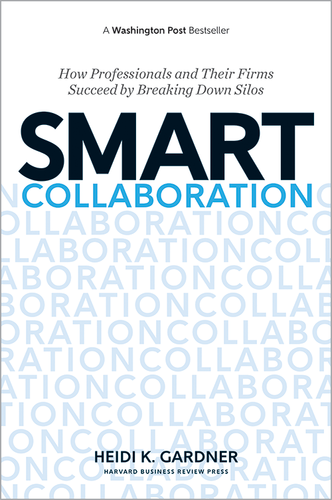Lucidea’s Lens: Knowledge Management Thought Leaders Part 6 – Heidi K. Gardner

Stan Garfield
 |
Heidi K. Gardner is a Distinguished Fellow at Harvard Law School’s Center on the Legal Profession and Program Chair of the Sector Leadership Master Class and Smarter Collaboration Master Class. |
Previously she was a professor at Harvard Business School and continues to teach executive education there and at other Harvard graduate schools. Heidi studies collaboration between highly autonomous, powerful knowledge workers such as partners in professional service firms, physicians, and research scientists. Her book, Smart Collaboration: How Professionals and Their Firms Succeed by Breaking Down Silos, provides hard evidence for why collaboration is essential in today’s complex world.
Her next book, Smarter Collaboration, captures new research, case studies and practical, tested applications of the concepts in industries ranging from healthcare, banking, government agencies, technology, manufacturing, media, retail and more. It is scheduled for release with Harvard Business Press in fall 2022.
Profiles
- Wikipedia
- Harvard Law School
- Harvard University Professional and Lifelong Learning
- Gardner & Co.
- Profiles in Knowledge
Posts
Book
Smart Collaboration: How Professionals and Their Firms Succeed by Breaking Down Silos

Table of Contents
- Introduction: Why Collaborate?
- Chapter 1: The Business Case for Collaboration
- Chapter 2: The People Case for Collaboration
- Chapter 3: Collaboration and the Solo Specialist
- Chapter 4: The Seasoned Collaborator
- Chapter 5: Collaboration and the Contributor
- Chapter 6: Collaboration for Ringmasters
- Chapter 7: Looking Sideways at Collaboration
- Chapter 8: Collaboration: Yes, Your Clients Care
Other Content
- Website: Gardner & Co.
- Smart Collaboration
- Over-committed organizations
- Harvard Business Review
- Harvard Business School
- ResearchGate
The Smart Collaboration Accelerator
The Seven Dimensions of Smart Collaboration
The Accelerator identifies and quantifies an individual’s behavioral tendencies. These are not immutable aspects of an individual’s personality but their natural ways of behaving. There are no good or bad behavioral preferences. No matter where a person sits on each dimension, this strength can be used as catalyst to improve collaboration when used with intentionality.
- Wary / Trusting: The level of inherent and contextual trust in others
- Complex / Concrete: Attraction to more complex problems and innovation
- Risk Spotter / Risk Seeker: Captures a person’s innate beliefs about the balance of risk versus opportunity when working with others
- Close / Distant: The frequency and nature of communication with others
- Hands on / Hands off: Level of need for control of one’s environment / work
- Responder / Initiator: Taking the initiative and anticipating events
- Individual / Group: Prioritizing working in groups on one’s own

Stan Garfield
Please enjoy Stan’s additional blog posts offering advice and insights drawn from many years as a KM practitioner. You may also want to download a copy of his book, Proven Practices for Implementing a Knowledge Management Program, from Lucidea Press. And learn about Lucidea’s Presto and SydneyEnterprise with KM capabilities to support successful knowledge curation and sharing.
Never miss another post. Subscribe today!
Similar Posts
Lucidea’s Lens: Knowledge Management Thought Leaders Part 106 – Hubert Saint-Onge
As the creator of the Knowledge Assets Framework Hubert has shaped how businesses integrate strategy leadership and knowledge sharing to drive performance.
Lucidea’s Lens: Knowledge Management Thought Leaders
Part 105 – James Robertson
James Robertson is a pioneer in intranet strategy and digital workplace design helping organizations create seamless employee experiences. As the Founder of Step Two and a respected industry voice he has shaped best practices in content management portals and digital experience design.
Lucidea’s Lens: Knowledge Management Thought Leaders
Part 104 – Vincent Ribière
Vincent Ribière advances knowledge and innovation management through AI creativity and KM. Explore his work in academia research and industry leadership.
Lucidea’s Lens: Knowledge Management Thought Leaders Part 103 – Tony Rhem
In this edition of Lucidea’s Lens: Knowledge Management Thought Leaders we highlight Dr. Tony Rhem a leading expert in AI big data information architecture and innovation. As CEO of AJ Rhem & Associates Tony has shaped the fields of knowledge management governance and emerging technologies.





Leave a Comment
Comments are reviewed and must adhere to our comments policy.
0 Comments